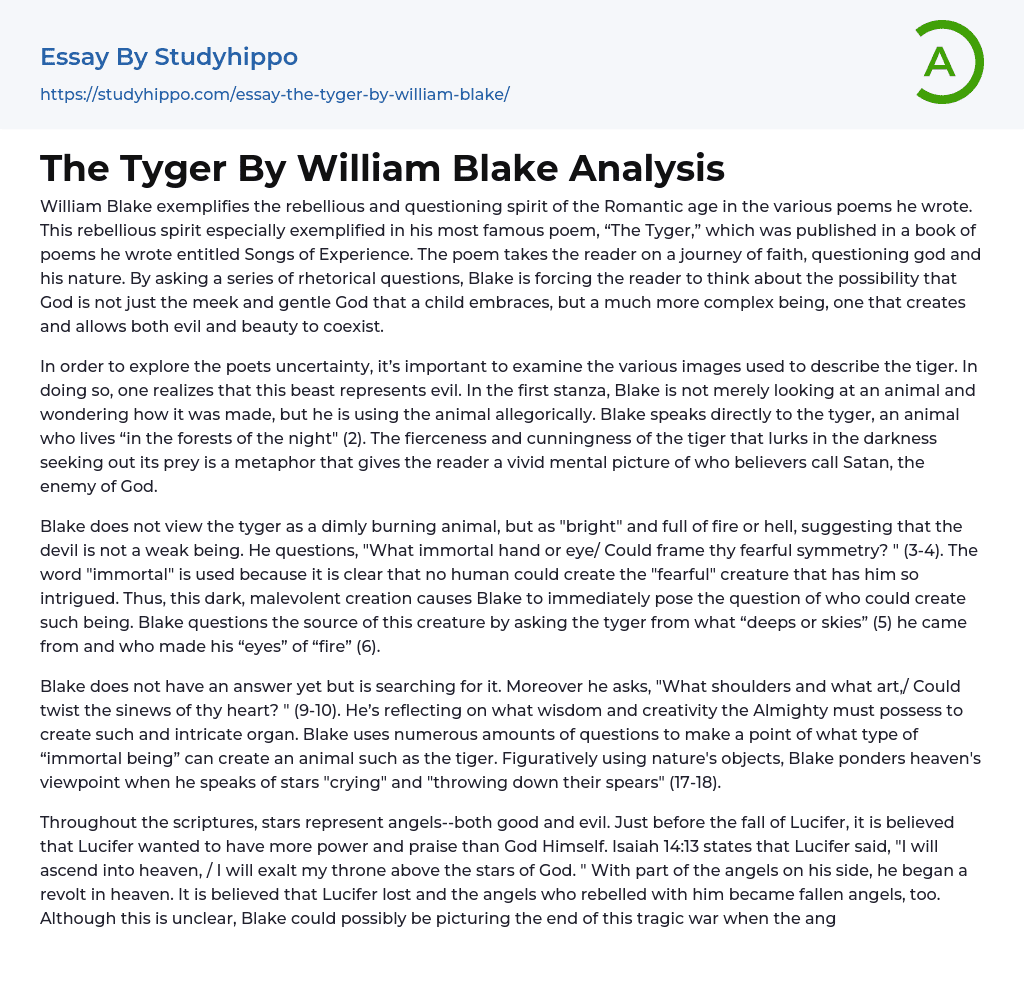William Blake demonstrates the rebellious and inquisitive nature of the Romantic era through his various poems. His most renowned poem, "The Tyger," which is part of his collection called Songs of Experience, encapsulates this rebellious spirit. The poem leads the reader on a journey of faith, where Blake questions the nature of God. Through a series of rhetorical questions, Blake compels the reader to contemplate the possibility that God is not merely a gentle and mild deity embraced by children, but a complex being who enables both evil and beauty to coexist.
To fully understand the poet's uncertainty, it is crucial to analyze the various descriptions of the tiger. Through this examination, one can recognize that the tiger symbolizes evil. In the first stanza, Blake extensively contemplates not only the
...physicality of the animal itself but also its symbolic meaning. Blake directly addresses the tyger, a creature that resides "in the forests of the night" (2). This metaphor vividly portrays the tiger's fierceness and cunningness as it prowls in darkness, seeking its prey. This representation draws a clear mental image of Satan, known as the adversary of God, for those who believe.
According to Blake, the tyger is not a faintly burning creature, but rather a bright and fiery one, resembling the devil as a powerful entity. He wonders about the origin and creator of this fearsome and symmetrical being, using the term "immortal" to emphasize that it could not have been made by a human. Therefore, Blake is immediately compelled to inquire about the source of this malevolent creation, asking the tyger where it emerged from and who formed it
blazing eyes.
Blake is currently searching for an answer and reflecting on the wisdom and creativity of the Almighty. He wonders about the type of being that could create an intricate organ like the heart, asking, "What shoulders and what art,/ Could twist the sinews of thy heart?" (9-10). Blake poses numerous questions to emphasize the magnitude of the creation of the tiger and ponders how heaven perceives nature's objects, such as stars "crying" and "throwing down their spears" (17-18).
Throughout the scriptures, stars symbolize both good and evil angels. According to the scriptures, Lucifer desired more power and recognition than God and began a rebellion in heaven. Lucifer's ambition is mentioned in Isaiah 14:13, where he declares his intention to ascend into heaven and elevate his throne above the stars of God. This rebellion led to the fall of Lucifer and his angels. The conclusion of this war is possibly depicted by Blake in his work, "the angels threw down their weapons."
The first four stanzas of the poem delve into the identity of the tyger's creator, while the fifth stanza takes a different approach, posing a thought-provoking question. Blake asks whether the same entity that created the gentle and harmless lamb also brought forth the fierce and ruthless tiger. In essence, he questions if both these contrasting creatures were made by the same divine being. Symbolically, the lamb embodies Christ, the Messiah, who was sacrificed for mankind's sins, while the tiger represents a predator devoid of sympathy for its prey.
William Blake demonstrates his curiosity about the origin of the devil through the use of poetic devices, metaphorically represented
as a tiger. The poem follows a cycle of questioning the creator of the tiger, exploring its creation, and then returning to question the creator once more. Throughout the poem, Blake raises the question of why a benevolent and loving God would create such a terrifying and wicked being that causes harm in our world. However, this question remains unanswered, indicating that Blake did not provide a definitive answer.
- Canterbury Tales essays
- Dulce Et Decorum Est essays
- My Last Duchess essays
- Beowulf essays
- Sir Gawain And The Green Knight essays
- The Road essays
- Aeneid essays
- Odyssey essays
- Blackberry Picking essays
- Beowulf Epic Hero essays
- Puritans essays
- Afterlife essays
- Buddhism essays
- Christianity essays
- Deism essays
- Faith essays
- God essays
- Hinduism essays
- Islam essays
- Jews essays
- Judaism essays
- Monotheism essays
- New Testament essays
- Ritual essays
- Sin essays
- Soul essays
- Theology essays
- Confession essays
- Devil essays
- Miracle essays
- Monk essays
- Revelation essays
- Atheism essays
- Immortality essays
- Jainism essays
- Sinners essays
- Bible essays
- Old Testament essays
- Salvation essays
- Temple essays
- Taoism essays
- Pilgrimage essays
- Freedom Of Religion essays
- Existence of God essays
- Christian Worldview essays
- Cosmological Argument essays
- Gautama Buddha essays
- Karma essays
- Buddha essays
- Baptism essays




